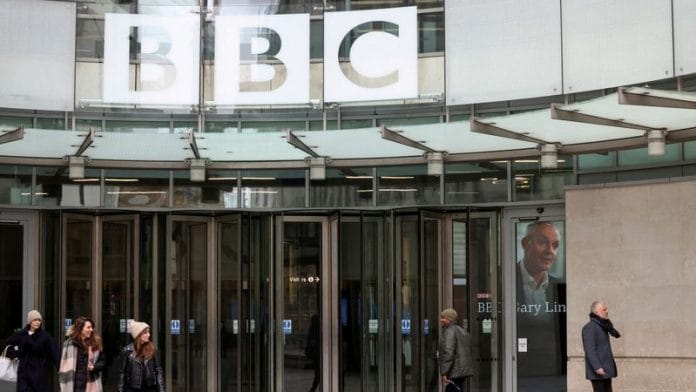New Delhi: The resignation of BBC director general, Tim Davie, and chief executive of the news division, Deborah Turness, has sent shockwaves across the global news ecosystem.
The duo has stepped down following startling revelations—a video of US President Donald Trump was “doctored” by the BBC to furnish a belief that it was Trump who incited the January 6 riots at the US capitol.
These allegations made their way into the public domain by way of a whistleblower. A 19-page dossier, compiled by a member of the BBC’s standards committee, found that the organisation had manipulated footage of Trump, interlacing two different segments. According to a report in The Daily Telegraph, a British newspaper, the documentary, which was aired on the BBC’s Panorama, made Trump say things that he didn’t “actually say.”
In a statement, Davie specified that the resignation was “entirely his decision.”
“Like all public organisations, the BBC is not perfect, and we must always be open, transparent and accountable. While not being the only reason, the current debate around BBC News has understandably contributed to my decision,” he said in a letter, which has been published in the BBC. “Overall the BBC is delivering well, but there have been some mistakes made and as director general I have to take ultimate responsibility.”
The BBC is the latest big media house at the centre of a dispute that is shaping discourse around news. Whether it’s the scourge of fake news, the onslaught of AI-generated videos, and the scarcity of fact checking—legacy media is no longer seen as a paragon of neutrality. Instead, organisations that have built foundations and created news cultures, are now viewed with suspicion. The New York Times has been subject to heavy criticism following the publishing of a report on sexual violence by Hamas, parts of which are believed to be falsified.
The revelations detailed in the memo have drawn responses from across the board. Trump took to Truth Social to express his glee, saying that BBC executives were caught doctoring his “very good (PERFECT!) speech of January 6th.”
“Thank you to The Telegraph for exposing these Corrupt ‘Journalists.’ These are very dishonest people who tried to step on the scales of a Presidential Election,” he added.
The memo claims to have exposed deep-seated biases in BBC reportage, also narrow focusing on coverage by BBC Arabic. According to the author Michael Prescott, who spent three years as an external advisor to the BBC, the network’s coverage is skewed against Israel—because it “gives extensive space to the views of Hamas.”
Prescott has also said that the corporation has LGBTQ+ employees who are injecting coverage with biases and “censorship” when it comes to the trans debate. The Daily Telegraph, refers to them as a “rogue unit” of reporters.
Also read: BBC apologises, edits episode after caller abuses PM Modi on live podcast
A political storm
While the charges levelled against the BBC are grave, and the organisation, for the most part, has failed to defend itself, there is also another debate that is playing out. While Prescott claims to have no political motivations, what has transpired at the BBC has become fodder for the British Right wing. The cooperation has long been pilloried for its purported ‘liberal biases.’
“The row obscures the context that explains what is, at the heart of the matter, a political campaign against the BBC that could act as a textbook example of how to confuse and undermine the kind of journalism that is, at the very least, aiming for impartiality in a sea of spin and distortion,” writes British journalist Jane Martinson in The Guardian.
A report in The Guardian highlights how a week of unfavourable press coverage—in which the BBC was made mincemeat by Right-leaning publications like the Daily Telegraph and the Daily Mail—created the conditions for the resignations.
“Davie should eventually emerge from his foxhole, and when he does, he should either give a convincing explanation for the Left-wing bias at the BBC, or else resign in favour of someone who will stop the rot,” wrote former conservative Prime Minister Boris Johnson in the Daily Mail.
“Unless he does so,” added Johnson, “I will simply stop paying my licensing fee—and suggest you do the same.”
The BBC runs on licensing fees paid by British citizens.
(Edited by Theres Sudeep)






